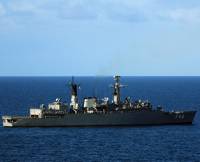In the first decade of the 20th century, Brazil attempted to stake out a space for itself as a major Western Hemisphere naval power, ordering a pair of dreadnought battleships from British yards in 1906. Dubbed Minas Gerais and Sao Paulo, these ships were as capable as any then in operation among the world’s navies, and indeed outgunned early British, German and American contemporaries. The acquisition of the two ships -- as well as the planned purchase of a third -- set off a naval race in the Southern Cone, with Chile and Argentina soon following suit. Unfortunately, the battleships were startlingly expensive, virtually bankrupting the Brazilian government. Brazil’s pursuit of regional naval hegemony ended when the poorly paid and brutalized sailors (.pdf) that made up the battleships’ crews turned their guns on Rio de Janeiro. After the revolt was quelled, the main guns of Minas Gerais and Sao Paulo were disabled, and the ships were allowed to decay over the next 40 years of intermittent service. Brazil’s first effort to declare itself a maritime power ended in expensive rust.
Today Brazil is far more prepared to engage in ambitious naval planning than it was in 1906. Its GDP exceeds that of Russia and India -- which along with China comprise the rest of the BRIC bloc -- not to mention a number of European states that have advanced fleets. Although Brazilian industry remains inexperienced when it comes to constructing modern, advanced warships, indigenous shipbuilding work over the past two decades has expanded the prospects for homegrown construction. Nevertheless, the Brazilian navy lags behind those of other comparable states. Spain, Italy, Russia and India are all developing modern, powerful platforms that make the obsolescence of the Brazilian fleet’s warships stand out in stark relief.
Navies perform several roles. They defend national interests against foreign enemies -- whether states, smugglers or pirates -- but they also help define and extend national prestige and political reach. On the former score, Brazil has few natural enemies. It is large enough to be secure against any potential South American foes, yet not powerful enough to challenge the United States. Unlike Argentina, it has no specific territorial disputes with European countries. Brazil does have offshore oil interests in the Atlantic, and there is some indication that it perceives itself to be in competition with the United States for influence in Latin America.

